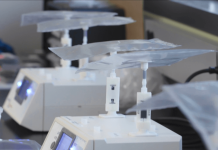Atia Vision received FDA investigational device exemption (IDE) approval to study its OmniVu lens system.
The Shifamed portfolio company can now begin a traditional feasibility clinical study of the novel intraocular lens. Atia Vision designed it to restore dynamic range of vision folllowing cataract surgery. It aims to improve upon the capabilities of current presbyopia-correcting lenses.
Related: Gradient Denervation Technologies wins FDA Breakthrough Device Designation
OmniVu Lens features two distinct components. First, it has a fluid-filled, shape-changing base that provides focusing capability, or zoom function. Second, its front optic docks into the base, providing optical power.
Additionally, the company engineered it with a more physiologic shape to fill the capsular bag. Atia Vision says it expects the system to preserve the eye’s anatomic integrity and elasticity. Its advanced design aims to provide patients with a more natural vision experience across all distances that continues to perform over time.
First-in-human and feasibility trials of the lens system led to more than 75 lens implants to date. Investigators followed patients for up to three years, seeing continuous range of focus from far through near. The company says 100% of patients achieved 20/20 or better uncorrected distance vision.
“This IDE approval marks a pivotal milestone in our mission to transform the standard of care for cataract patients,” said Mariam Maghribi, CEO of Atia Vision. “OmniVu was developed to solve for the limitations of both accommodative and traditional lenses. Our technology represents a significant advancement in lens design by addressing both optical and functional compromises found in current solutions.”




